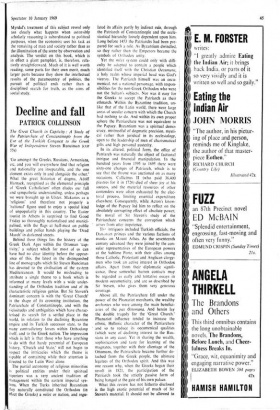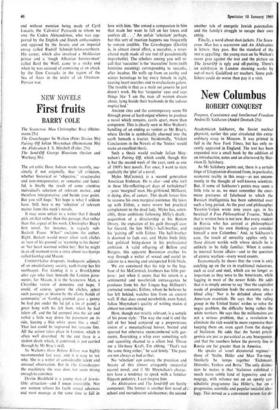The Great Church in Captivity: A Study of the Patriarchate
of Constantinople from the Eve of the Turkish Conquest to the Greek War of Independence Steven Runciman (cur 55s)
Decline and fall
PATRICK COLLINSON
`Go amongst the Greeks, Russians, Armenians, etc, and you will everywhere find that religion and nationality are inseparable, and the one element exists only in and alongside the other.' What the great historian of dogma, Adolf Harnack, recognised as the elemental principle of 'Greek Catholicism' often eludes our full and sympathetic understanding, unless perhaps we were brought up in Ulster. Makarios as a `religious' and therefore not properly a 'national' figure used to enjoy a special kind of unpopularity in this country. The Easter tourist in Athens is surprised to find Good Friday so thoroughly nationalised and munici- palised, with the flags at half-mast on public buildings and police bands playing the 'Dead March' in darkened streets.
Behind these things lies the history of the Greek Dark Ages within the Ottoman 'cap- tivity,' a subject which for most of us can have had no clear identity before the appear- ance of this, the latest in the distinguished line of monographs which Sir Steven Runciman has devoted to the civilisation of the eastern Mediterranean. It would be misleading to attribute a single theme to a book which is informed at many levels with a wide under- standing of the Orthodox tradition and of its characteristic religious genius. But Sir Steven's dominant concern is with the 'Great Church' in the shape of its crowning institution, the Patriarchate of Constantinople, and with the vicissitudes and ambiguities which have charac- terised its search for a settled place in the world, in relation to the declining Byzantine empire and its Turkish successor state, to the many contradictory forces within Orthodoxy itself, and to the Greek nation. The impression which is left is that those who have anything to do with that hardy perennial of European history, 'Church and State,' will not begin to suspect the intricacies which the theme is capable of containing while their attention is directed to the Latin West alone.
The partial autonomy of religious minorities as political entities under their spiritual superiors was a very ancient tradition of management within the eastern imperial sys- tems. When the Turks inherited Byzantium they naturally constituted the Orthodox (in effect the Greeks) a mile: or nation, and regu-
lated its affairs partly by indirect rule, through the Patriarch of Constantinople and the eccle- siastical hierarchy loosely dependent upon him. Long before 1453 the Patriarchs had been pre- pared for such a role. As Byzantium dwindled, so they rather than the Emperors became the symbols of Orthodox unity.
Yet the miler system could only with diffi- culty be adapted to contain a people which identified itself with the Christian Oecumene,
a holy realm whose imperial head was God's viceroy. The Patriarch himself was an oecu- menical, not a national personage, with respon- sibilities for the non-Greek Orthodox who were not the Sultan's subjects. Nor was it easy for the Greeks to accept the Patriarch as their ethnarch. Within the Byzantine tradition, un- like that of the Latin world, there were large areas of secular concern with which the Church had nothing to do. And within its own proper sphere the Patriarchate was not equivalent to the Papacy. Byzantium was a spiritual demo- cracy, mistrustful of dogmatic precision, mysti- cal rather than juridical in its ecclesiology, open to the leadership of men of charismatical gifts and high personal austerity.
In its altered, political form, the office of Patriarch was naturally the object of factional intrigue and financial manipulation. In the hundred years from 1595 to 1695 there were sixty-one changes of Patriarch, which is to say that the throne was auctioned on as many occasions. Callicinus II (who paid 36,400 piastres for it in 1726) died of sheer joy at his success, and the material resources of other contenders were often exhausted by the elec- toral process, limiting essential expenditure elsewhere. Consequently, while Acton's know- ledge of the Papacy led him to reflect on the absolutely corrupting effect of absolute power, the moral of Sir Steven's study of the Patriarchate concerns the corruption which arises from utter impotence.
Th- intriguers included Turkish officials, the Danuoian princes and the various factions of monks on Mount Athos. As the seventeenth century advanced they were joined by the con- sular representatives of the European powers at the Sublime Porte, with their allies among those Catholic, Protestant and Anglican clergy- men who took an active interest in Orthodox affairs. Apart from their diplomatic signifi- cance, these somewhat barren contacts may be regarded as early and tentative essays in modern oecumenicity, and are so described by Sir Steven, who gives them very generous coverage.
Above all, the Patriarchate fell under the power of the Phanariot merchants, the wealthy archontes who were among the main benefici- aries of the pax Ottomana. And herein lay the double tragedy for the 'Great Church.' Phanariot influence tended to increase the ethnic, Hellenic character of the Patriarchate and so to reduce its oecumenical qualities (which were of declining interest to the Rus- sians in any case). Yet in sharing the wealth, sophistication and taste for learning of the magnates, together with their clientage of the Ottomans, the Patriarchate became further de- tached from the Greek people, the ultimate legatees of the Orthodox spirit. And this was one reason why, when the Greeks began their revolt in 1821, the participation of the Patriarch took the strictly passive form of being hanged at the gate of his own palace.
What this review has not hitherto disclosed is the high exotic potential of much of Sir Steven's material. It should not be allowed to
end without mention being made of Cyril Lucaris, the 'Calvinist' Patriarch to whom we owe the Codex Alexandrinus, who was sup- ported by the English and Dutch ambassadors and opposed by the Jesuits and an imperial envoy called Rudolf Schmidt-Schwarzenhorn. His career, which also involved a Moldavian prince and a 'tough Albanian businessman' called Basil the Wolf, came to a sticky- end when he was accused of conniving at an attack by the Don Cossacks in the region of the Sea of Azov in the midst of an Ottoman- Persian war.



































 Previous page
Previous page